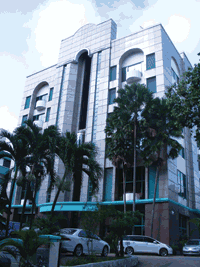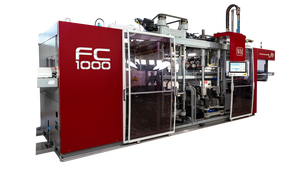Who’s afraid of competition from China? Not Tempco. This thermoset molder knows its strengths and continues to make the most of them. Grimacing for his obligatory IMM plant tour photo, Tempco managing director Matthew Goh says, “I personally want to maintain a low profile but I wish the profile of thermoset molding was a lot higher than it is. We would welcome more players if it helped get the word out.”
September 11, 2008
Who’s afraid of competition from China? Not Tempco. This thermoset molder knows its strengths and continues to make the most of them.
Grimacing for his obligatory IMM plant tour photo, Tempco managing director Matthew Goh says, “I personally want to maintain a low profile but I wish the profile of thermoset molding was a lot higher than it is. We would welcome more players if it helped get the word out.”
Goh laments that many designers and engineers at multinational corporations have never even heard of bulk molding compounds (BMC), while students taken in by Tempco on attachment from technical colleges are similarly in the dark over thermoset resins in general. “Ninety-nine percent of the world’s injection molding machines cater to thermoplastics. There is definitely a fear factor when it comes to taking the plunge and adopting thermosets, but once we convince customers to give it a go, they are generally sold on the technology,” he notes.
Case in point: Power tool manufacturer Hitachi Koki was having problems with thermoplastics (TPs) but was wary of making the jump. “We built a tool for them free of charge and ran a part for comparison. It took us four years to fully convince them but they’re now using phenolic resins extensively and enjoying 20% savings on processing costs.”
Overcoming misconceptions about BMC
In this age of high resin costs, thermoset resin users are not being impacted to anywhere near the same extent as TP users. “Eighty percent of a thermoset molding compound is filler and any rise in price is primarily influenced by the 20% resin component,” says Goh. Current prices of BMC materials are in the $1.60–$2.00/kg range.
Savings in processing costs highlight a pet peeve of Goh, namely the belief that thermosets are environmentally unfriendly and difficult to recycle. “Firstly, our barrel temperature is typically only 40°C so you save energy there,” notes Goh. “Moreover, you also don’t need any energy-intensive dryers, so overall, while tool temperatures of 150-170°C are employed, you save on energy.”
With the intelligent use of induction coils, Tempco has reduced by 70% the energy cost required to heat tooling compared to cartridge heaters or oil circulating heater systems. Goh estimates that on average, it takes 6800 kWh to process 1 ton of engineering plastic vs. 600 kWh for BMC. Cycle times are generally similar to TP parts. On recyclability, “We can reuse all scrap as a filler,” says Goh.
What thermoset resins are not, however, are drop-in replacements for TPs. “Stringent testing is required for electrical and electronics applications and it can take up to four years to gain approval,” says Goh. “You definitely need a long-term outlook. It might take 18 months from concept to part and then 18 months for approval after long-term testing.” Goh’s view is that, while a company needs substantial staying power to be in the thermoset molding business, once a product is approved it tends to stay around for a long time.
The life of thermoset molding compounds, however, is limited. “‘Dough’ life is normally around three months but this can be extended to six months if you store it in a controlled atmosphere and use the right additives,” says Goh. Tempco’s suppliers include IDI Composites, Showa Hipolymer, Menzolit, and Lorenz Kunststofftechnik. Goh adds that with today’s thermoset technology, molding compounds can be tailored to realize, for example, positive shrinkage.
No dust gathers here
Goh concedes that the general impression of thermoset mold shops is that they are dirty and stuffy, and typically employ old equipment, but the Tempco plant in tropical Singapore does not lend itself to this stereotype. “The biggest problem in the thermoset molding industry is that processors tend to hold on to their machines for a long time, but we do not adhere to this,” he says. “We believe in continuous upgrading and replace our machines every four years. This leads to lower maintenance costs and better energy efficiency.”
|
Tempo also maintains a close relationship with its machine supplier, Arburg, and the two work together to improve machines continuously. One example of this cooperation is Tempco’s stable of 12 vertical machines for molding epoxy compounds, which were developed with major input from the molder. Further evidence is the fact that the machine supplier leases its Singapore office from Tempco on the ground floor of the plant.
Looking at machine technology, all but two of Tempco’s 75 thermoset machines employ inline screws. “Europe has traditionally used screws for BMC while Japan opts for plunger machines because it’s believed that parts have better mechanical strength due to less fiber damage. The downside is part finish is less uniform,” says Goh. “But with current technology you more or less get the same performance from either technology. We operate just two plunger machines, and only because some customers insist on it and some large parts might best be molded using a plunger machine.”
Finding what works
Unlike many processors in Southeast Asia, all of Tempco’s manufacturing remains in Singapore, even though its customer base is global and includes companies operating in lower-cost countries like China, Malaysia, and Thailand.
“A lot of people feel Singapore is high cost but I’d like to dispel that notion,” says Goh. “Sure, labor costs are higher on the surface, but at the end of the day, labor only accounts for 5% of our operating expenses. On the plus side, we have a more flexible workforce that can multitask between adjusting molding machines and operating CNC machines, for example.” All shop floor employees are equally conversant with TS and TP machines.
Despite being located in “high-cost” Singapore, not a robot is to be seen in Tempco’s operation. “We let nature take care of part removal. Parts drop out in gravity free fall,” says Goh. “We can’t justify the cost of robots, especially since a lot of our production runs are short.” Further, insert molding processes may be difficult to automate given the temperatures involved. Inserts can be preheated to 170°C, as is the case with stators, prior to mold insertion. BMC dough is also fed manually to machine hoppers.
Short production runs are, in fact, something of a specialty at Tempco. “I am unconventional in that I will go for small runs as typically the customer will pay more. Most processors shun short runs and go for high volume but we never turn away such work. It could lead to bigger runs.”
Singing the praises of Singapore
The cost of land is also higher in Singapore but Goh says this can be mitigated by building upwards. Tempco’s operations are split over four levels. Thermoplastic and rubber molding takes place on the first level, BMC and epoxy molding on the second, and phenolic molding in the third. The rooftop of Tempco’s plant is currently being converted into a warehouse to free up more room for production operations on the third level. “There is more incentive in Singapore to utilize plant floor efficiently,” says Goh. “You end up with machines spaced closer together and this has a measurable effect on efficiency in that workers don’t have to move as far to accomplish tasks.
“You can also make more efficient use of land by operating 24 hours, 365 days of the year,” he adds. “This is not possible in China, where they have long holiday breaks and electricity shortages sometimes necessitate shutdowns.”
Another key factor in Singapore’s attractiveness is logistics efficiency. The port of Singapore is superefficient, and Tempco can also ship by truck to Malaysia and Thailand. This logistics efficiency means Tempco can concentrate on running the plant. “We don’t really have to be close to our customers,” says Goh. “All it takes is good production planning.”
Goh also has something to say about setting up shop overseas. “If you take your factory to China, you don’t take your know-how as well.” He adds, “It’s a fallacy that the technology is in the machine. It’s really in the person. I’ve proven this by the fact that we are still surviving and indeed growing in Singapore. I am not even thinking about setting up overseas.”
The power’s in the person
Further, Goh says employee turnover is almost zero in Singapore. “It’s high in other countries and when it happens, you lose your company’s knowledge base.” In-house training is a key part of the Tempco success story, but Goh values passion for the job just as highly, if not higher, than the technical skills of his staff. “You must have passion in this industry, and have fun getting the job done. Otherwise, you won’t put in your best effort.”
Honesty is also a highly prized asset. “If an employee makes a mistake, I am not going to scold him. If they tell me exactly what happened, we’ll be perfectly placed to make sure it doesn’t happen again,” explains Goh. “Ninety-nine percent of mistakes are caused by humans and 99% can be solved by them.”
And Tempco is indeed a company that’s up to overcoming challenges. “Our company philosophy is to handle things that others don’t want to do, are difficult to do, or that no one knows how to do,” says Goh. One solution Tempco came up with involves a switch away from injection molded epoxy to sheet molding compound (SMC) for vane components employed in a tidal power generation system. “Injection molding resulted in too many air bubbles,” says Goh. The components are made on two SMC lines operated by Tempco at a separate location.
So what’s ahead for Tempco? Expansion. “We are building another plant at Jurong [in western Singapore] to expand four-fold to 400 machines,” says Goh. “The new Jurong plant will house 300 machines.” With no sales force, word of mouth has proved effective in building Tempco’s business to date and Goh is confident its track record and experience will hold in good stead when it comes to utilizing the resources of this new plant.
Tempco Mfg. Pte. Ltd., Singapore
Facility size: 12,200 m² (131,319 ft²)
Annual sales: (2007) S$50 million (US$36.5 million)
Markets served: Electrical, electronics, power tools, hygiene, automotive, appliances
Customers: Dyson, GE, Hager, Hitachi Koki, Schneider Electric, Terasaki
Capital investment: S$22 million (US$16.1 million)
Parts produced: 34 million/year
Materials processed: Unsaturated polyester bulk molding compound, phenolic resin, epoxy resin, glass-filled PC
Resin consumption: 3300 tonnes/year
No. of employees: 150
Shifts worked: Three 8-hour shifts, seven days/week
Molding machines: 100 Arburgs (75 for TS, 25 for TP)
Secondary operations: Part deflashing, thermoset resin machining (drilling and tapping), silkscreen printing, ultrasonic welding
Other services: Sheet molding compound processing, metal stamping, powder molding, assembly, coil winding
Internal moldmaking: Yes, seven tools/month
Quality: ISO 9001
Contact information
Matthew Goh | [email protected] web.singnet.com.sg/~tempco/
You May Also Like

















